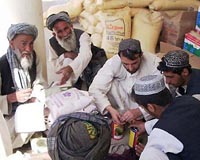 |
Islamabad (AFP) July 23, 2010 Pakistan Prime Minister Yousuf Raza Gilani Thursday gave army chief General Ashfaq Kayani three more years in the top job, saying the country had reached a vital stage in the battle against militants. The premier said that the decision to give the extension to the 58-year-old -- viewed by many as the most powerful man in the country -- had been taken to ensure continuity of command. Gilani made the announcement in a brief televised address to the nation, underlining the importance of the move. "I have decided to extend tenure of army chief General Ashfaq Kayani for three years in consultations with President Asif Ali Zardari," the prime minister said. He added that the decision had been taken after relaxing the rules and keeping in view the key role played by Kayani in the war against terror. Kayani assumed command of the Pakistan army in November 2007 after his predecessor Pervez Musharraf relinquished command amid international pressure to end his eight years of military rule. Bombs and attacks blamed on Taliban and Al-Qaeda-linked militants have killed more than 3,500 people across nuclear-armed Pakistan since government troops besieged a radical mosque in Islamabad in July 2007. Much of the violence has been concentrated in northwest Pakistan and the border areas with Afghanistan, where US and NATO troops are battling to turn around a nine-year war against Taliban insurgents. "As a commander and leader of his men, Kayani always stressed that democracy is inevitable for peace, progress and prosperity," the premier said. He added that Kayani personally supervised and planned all offensives. "Pakistan is passing through a very critical juncture of its history with our people and armed forces engaged in the war against terror," Gilani said. He said the entire nation stood united in the war against terrorists and the operation against them had entered a critical stage. Gilani said that successful military operation in northwestern regions Swat and Malakand and the tribal region of South Waziristan had only been possible under the dynamic leadership of Kayani. Pakistan launched a blistering air and ground offensive in Swat and Malakand early last year after militants marched out of Swat and advanced to within 100 kilometres (60 miles) of the capital Islamabad in April 2009. After heavy fighting that displaced an estimated two million people the military declared the region back under army control last summer. Also last year, Pakistan launched its most ambitious military offensive yet against Taliban militants in South Waziristan, expanding the campaign to many of the other seven semi-autonomous tribal districts hugging the Afghan border. Washington calls the tribal belt a global headquarters of Al-Qaeda and the most dangerous place on Earth. Kayani was born into a working class family in April 1952 in a suburb of Rawalpindi, the garrison city where the Pakistan military is headquartered. His father was a non-commissioned officer from Punjab, where the army draws much of its manpower, and Kayani's meteoric rise after joining the army in 1971 is a rarity in Pakistan's privilege-dominated society. "The basic consideration of the government behind extending Kayani's tenure is to ensure continuity of military command and policy in the ongoing anti-terror war," analyst Hasan Askari told AFP. He added: "Kayani has developed good rapport with top US and NATO military officials, which has been very helpful for Pakistan to put across its point of view on critical issues." America's top military commander, Admiral Mike Mullen, has praised Kayani for taking "bold steps", saying he has moved troops to the Afghan border, cracked down against militants and equipped the paramilitary Frontier Corps. "General Kayani also suits our government because he never created any problems for them," Askari said. "There are no misunderstandings between the military and the civilian government, which is a good sign."
Share This Article With Planet Earth
Related Links News From Across The Stans
 Outside View: Afghanistan's tribal trouble
Outside View: Afghanistan's tribal troubleKabul, Afghanistan (UPI) Jul 22, 2010 Former CIA Director Richard Helms counseled that when dealing with societies in and around the Middle East, pay attention to the things that are hundreds of years old - the religious sects, the clans, the tribes. Military victory in Afghanistan will only come in the form of a political solution based on reconciliation between the Pashtun and the other Afghan tribes. A tribal confederat ... read more |
|
| The content herein, unless otherwise known to be public domain, are Copyright 1995-2010 - SpaceDaily. AFP and UPI Wire Stories are copyright Agence France-Presse and United Press International. ESA Portal Reports are copyright European Space Agency. All NASA sourced material is public domain. Additional copyrights may apply in whole or part to other bona fide parties. Advertising does not imply endorsement,agreement or approval of any opinions, statements or information provided by SpaceDaily on any Web page published or hosted by SpaceDaily. Privacy Statement |